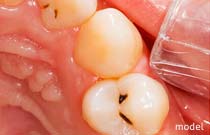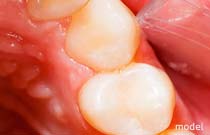Visit Our Office 77 Rolling Oaks Dr., Thousand Oaks, CA 91361(805) 379-5262
Baby Bottle Tooth Decay
Baby bottle tooth decay refers to tooth decay that affects babies, toddlers and young children. When milk, formula, juice and other sweet liquids have extended contact with the teeth, oral bacteria are able to use the sugars for fuel. They release acidic byproducts that attack the dental enamel and erode it. Significant damage can occur.
Children who are at the greatest risk of baby bottle tooth decay are those who are put to bed with a bottle or those whose pacifiers are dipped in sugar or other sweet liquids. Saliva helps rinse away bacteria and other debris, but saliva flow slows during sleep. This gives oral bacteria even more of an opportunity to do their damage.
Because baby teeth are temporary, many people dismiss decay in them as trivial. Unfortunately, baby teeth do play an important role in the development of your child. These early teeth allow your toddler to eat and to learn to speak properly. Front teeth are most commonly affected by baby bottle tooth decay, which means that older children may feel self-conscious about their appearance. Just as important is the fact that baby teeth act as placeholders for permanent teeth, and if they are lost or extracted too early, these teeth may erupt improperly and require later orthodontic or other corrective treatments.
You can reduce your child’s risk of tooth decay by wiping his or her gums with a wet washcloth after each feeding. As soon as the first tooth erupts, begin to brush with a soft toothbrush and continue wiping the gums that do not yet have teeth. When you offer your child water, offer tap water, which contains tooth-strengthening fluoride. Bottles should only be used for milk, water and formula. Do not dip a baby pacifier in sweet solutions, and do not allow your child to fall asleep with a bottle of anything other than water.
Healthy baby teeth are the best way to ensure healthy adult teeth.
Contact our office today to learn more about how to avoid baby bottle tooth decay or to schedule a first appointment for your child with our Thousand Oaks pediatric dentist.



